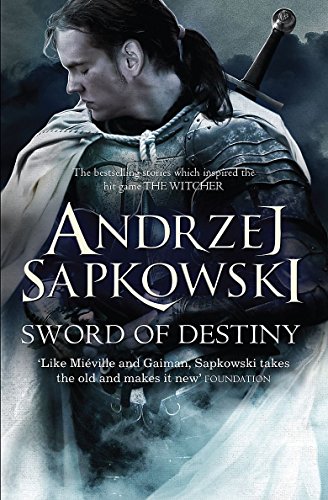


A Shard of Ice develops his love for Yennefer, testing it when he encounters a powerful wizard that also loves her. The following tale reinforces the implacability of the witcher’s antagonist.

The narration is also profoundly ironic: when a character tells a guard that he deserves a promotion for not accepting a bribe, the narrator jokes that the guard had a professional future precisely because he would eventually accept a larger one. Since modifying one’s destiny is, by definition, an impossible action, it becomes interesting to note how Geralt and Yennefer act in the face of increasingly bizarre situations, clinging to their existence in a hopeful manner: if the impossible is indeed possible, maybe they can conquer destiny after all. The narrative is developed by the interaction between the members of this group, with various fantasy tropes – like unscrupulous mercenaries, honorable paladins, and sensible druids – being satirically examined while they discuss their worldview and what events their journey might put into motion. The first story, The Bounds of Reason, is a sarcastic adventure in which Geralt joins an eclectic group of hunters that is set to kill a dragon for a young king. The witcher, however, knows that to defy fate is to confront the conformism and inertia inherent to it, which can be a far more complicated feat than beheading mandrakes and banishing werewolves. Geralt fears the hands of destiny but wants to face it head-on and cease its influence on him. The events that transpire around him are fraught with fatalism. I’m sorry.” Geralt’s main antagonist, therefore, is not the monsters he fights or the society he despises, but destiny itself. You were made for each other, you and the Witcher. In the opening tale, for example, one of the characters tells the sorceress: “ It is written all over your faces, I don’t even have to try to read your thoughts. Geralt’s relationship with Yennefer is one of the first elements to be problematized in the narrative. The narrative frames this conflict around Geralt’s personal and professional life, focusing on his impossible relationship with the sorceress Yennefer and on the Witchers’ tradition of recruiting special children. This theme, as the title suggests, is the fight against everything that is predetermined: Geralt wants to prove that the responsibility for building his own future lies only on his shoulders and is not set in stone. Here, Andrzej Sapkowski maintains the structure and style of the previous book, presenting episodic tales packed with irony and social criticism while developing the protagonist around the story’s main theme. Sword of Destiny is the second volume of The Witcher saga, which began with The Last Wish.


 0 kommentar(er)
0 kommentar(er)
